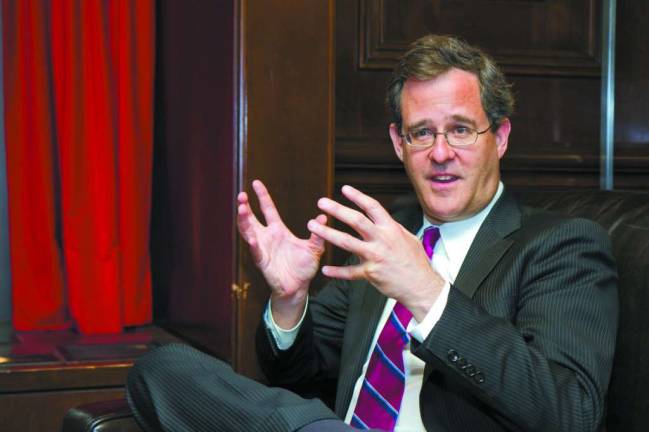Will Labor Pains Give Birth to A New Mayor?

Why average voters should care about union endorsements
One of the reasons New York has had Republican mayors for the last 20 years is because the City's public and private sector unions have fragmented in Democratic primaries.
Guess what? Even though labor talked about unifying around one candidate in 2013, history is about to repeat itself. The major unions have split, backing different Democratic candidates; Quinn's got the backing of Retail Workers (RWDSU), Liu has city employees (DC37), de Blasio has health care workers (1199), Thompson has the Uniformed Officers Unions, and the United Federation of Teachers (UFT) is likely to back either Thompson or Liu. Only the Working Families Party (WFP), an amalgam of unions that needs a 60 percent quorum to give their line to a Mayoral candidate, has yet to endorse, and probably won't until after the primary.
Why should voters who don't belong to unions care about who these organizations support?
Well, now more than ever, the city's fiscal health and tax policies are inextricably linked to how the next mayor handles labor negotiations in 2014.
For the past four years, all the city's union have been working without an official contract.
(What many fail to realize, however, is that there were some smart labor leaders like Greg Floyd at Teamsters Local 237 who got his members a four percent annual cost of living increase since then, so there have actually been some unions who have little claim to "retroactive raises," because, essentially, they've already received them.)
The bottom line is: the next mayor may be facing an unfunded liability of approximately $10 billion, if one believes that the city's unions deserve retroactive raises to make up for the last four years. That's almost 15 percent of the annual $70 billion budget -- a huge looming gap that would either necessitate deep cuts to services or a whopping tax increase for all New Yorkers.
That's not a great choice for an incoming mayor who will potentially be saddled with increasing the size of the police force (it's dropped 12 percent in the past decade), spending more education dollars to make sure the "Common Core" curriculum doesn't fail, and fighting pushback from citizens (and the real estate industry) who have seen property taxes skyrocket in the past decade.
So far, we have not seen any creative plan from the mayoral candidates. The GOP frontrunners -- John Catsimatidis and Joe Lhota -- take the expected conservative line that the city cannot afford retroactive raises and that's that. That's more than their potential November opponents have done thus far.
Among the Democrats, johnny-come-lately Anthony Weiner has made the most intriguing half-attempt to confront this issue by saying that any retroactive raises have to be weighed against requiring city employees to pay a portion of their health care premiums as most other cities -- including New York state government workers -- already do.
The other leading candidates, Bill Thompson, Christine Quinn and Bill de Blasio, all say they don't want to negotiate future union deals in public (Translation: they either don't want to jeopardize those union endorsements or they don't have a clue yet on how to pay for these retroactive raises).
John Liu, who is running so far to the left that he should see if the Socialist Party Line is still available, believes we must pay those $10 billion in retroactive raises but as far as I can tell, he has not offered a concrete plan of how to pay for them.
So, it looks like another circular firing squad on the Democratic side this year with four union-backed candidates alternately pandering for endorsements and then trying to swivel back to the middle to try to assure New York's powerful business and real estate interests that they will be their champion, too.
And then there's the outsider: fast-talking and glib Anthony Weiner, who has the luxury of speaking his mind and not being constrained by his desire to get union support -- because he just get it won't no matter what he does at this point. The same goes for Lhota and Catsimatidis.
Look for those three candidates to hopefully put forward some smart ideas and a plan in the coming months that will balance the interests of city workers and the city's taxpayers.
As for the Democratic primary scrum -- let's watch and see if labor's fragmented support once again delivers a mayor to City Hall who has not been endorsed by many of the major unions.
In 1993 and 2001, the winners for Mayor -- Rudy Giuliani and Mike Bloomberg -- were not labor's first choice.
Will 2013 continue that 20-year streak of labor unions backing losers?
Tom Allon, a former member of the United Federation Teachers, is the president of City and State, NY and a former Liberal Party-backed candidate for Mayor. Questions or comments? Email tallon@cityandstateny.com